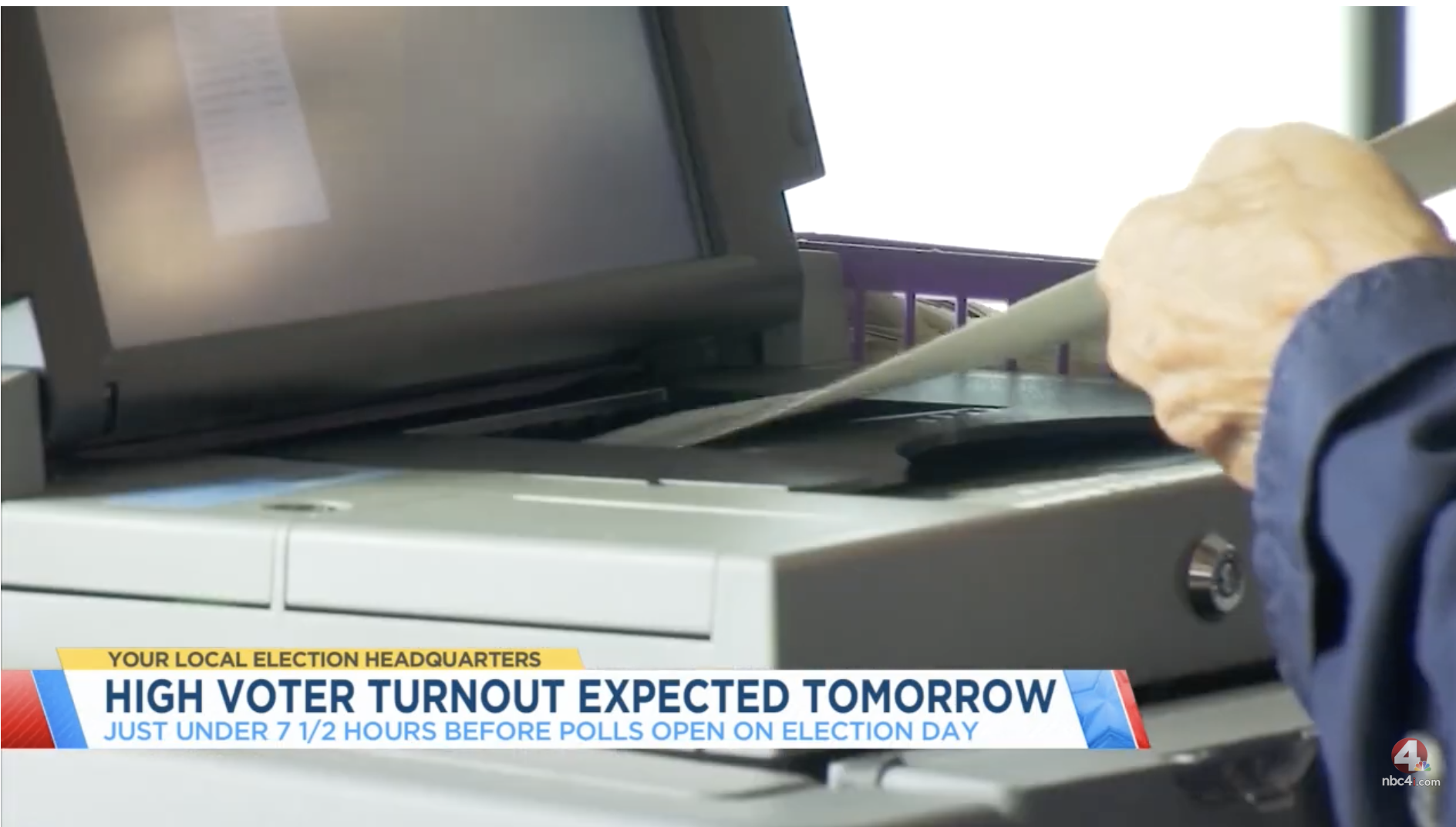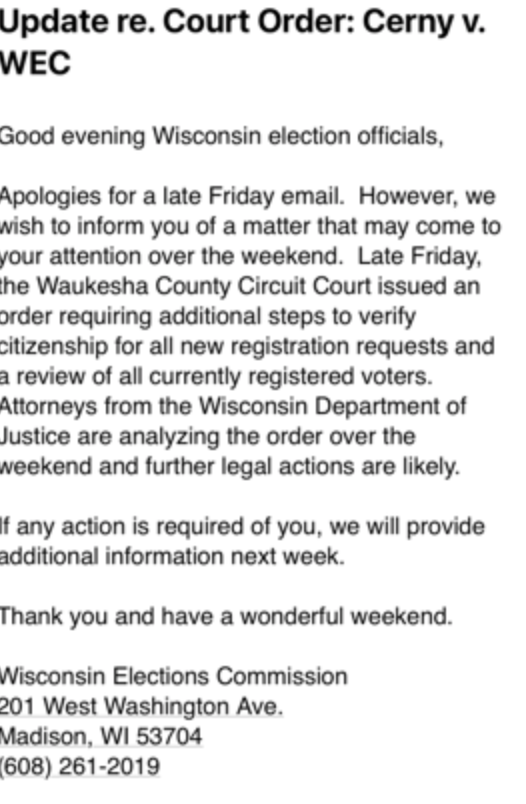


A state court ruling late last week ordering the Wisconsin Elections Commission to deal with its dirty voter rolls could have national implications in the election-integrity battle to ensure only U.S. citizens vote in U.S. elections.
Waukesha County Circuit Judge Michael Maxwell issued writ of mandamus requiring the state’s election regulator check Wisconsin’s voter registration list for noncitizens. The judge enjoined the Elections Commission and local elections offices from accepting voter registrations without first verifying the citizenship status of the applicant.
“WEC has a plain and positive duty to verify U.S. citizenship of every person seeking to register to vote in Wisconsin. Further, WEC has a plain and positive duty to determine whether any non-citizens are currently listed as eligible voters on Wisconsin’s voter rolls,” Maxwell wrote in his 13-page ruling.
Signaling that it isn’t all that interested in keeping noncitizens off of the Badger State’s voter rolls, the Elections Commission has already appealed the circuit court’s order. The controversial commission was in contact Friday evening with the hundreds of local elections clerks within a couple of hours of the court’s ruling, according to an email obtained by The Federalist.
“Attorneys form the Wisconsin Department of Justice are analyzing the order over the weekend and further legal actions are likely,” the email informed.

Kevin Scott, who joined fellow Milwaukee-area attorney Mike Dean in representing two Wisconsin voters in the lawsuit against WEC, said it is curious that the commission would appeal a judicial order requiring it to follow the law.
“I’m not sure why?” Scott told The Federalist in an interview.
But the “why?” might be easy enough to answer. The commission, run by three far-left Democrats often backed by two of three go-along Republicans, has a history of resisting timely voter roll cleanups and other election-integrity measures.
‘The Judge Rejected That Position’
Wisconsin voters Ardis Cerny and Annette Kuglitsch sued the six members of the Elections Commission, WEC’s left-leaning administrator, Meagan Wolfe, and Wisconsin Department of Transportation Secretary Kristina Boardman alleging the two agencies refuse to cooperate with each other in sharing data to track noncitizens on the voter rolls. The plaintiffs claim that their votes are being diluted by foreign nationals voting in Wisconsin’s elections. The complaint notes the one-man, one-vote principle, and that lawful votes must be protected against “impairment result[ing] from dilution by a false tally.”
In its motion to dismiss, the Elections Commission argued that state law doesn’t require the regulator to vet the voter rolls for noncitizens.
“Shockingly, the agency that Wisconsin’s citizens rely upon to ensure the integrity of our electoral process claims Wisconsin statutes ‘do not require the Commission to prevent non-U.S. citizens from appearing on the list or to remove non-U.S. citizens from the list,’” the judge wrote in his ruling.
The Elections Commission has alternately claimed that it does and does not have authority over the state’s voter rolls, Scott said.
“Ultimately, the judge rejected that position and determined rightly, I believe, that the Wisconsin Elections Commission is accountable for the voter rolls. That includes ensuring that they are conducted in a lawful, accountable, and transparent way,” the attorney told The Federalist.
‘WEC is Failing’
As The Federalist reported last year, then-state Secretary of Transportation Craig Thompson also had argued that elections officials can’t check DOT’s citizenship information against the names of registrants on the WisVote list, the state’s voter registration database, insisting privacy laws prevent such reviews. In a letter last year to the State Assembly’s elections committee, Thompson wrote that WEC and DOT’s current matching program outlined in state statute is “statutorily limited to the personally identifiable information on the official registration list under the Help America Vote Act.”
The Elections Commission is wrong, according to the court ruling. Wisconsin statutes, it notes, are filled with requirements that only eligible, lawful voters may cast ballots in Badger State elections.
“WEC has no discretion whether to include non-U.S. citizens in the official voter roll, because the official voter roll may only include those ‘electors [who] are properly registered to vote,’” the court filing states, quoting state election law.
“WEC is failing in the most basic task of ensuring that only lawful voters make it to the voter roll from where lawful votes are cast,” the order adds.
And Wisconsin statute demands accuracy in voter registrations. Matching information through DMV’s database is necessary to “verify the accuracy of the information provided for the purpose of voter registration.” The Help America Vote Act, as state law, requires proof of residency, not “self-reporting affirmation,” the court ruling asserts.
“Proof of citizenship is no different under Wis. Stat. § 85.61 and HAVA,” the filing adds. “WEC fails the citizens of Wisconsin again in this regard.”
‘Troubling Pattern’
Last year, Wisconsin voters approved an amendment to the state’s constitution ensuring that only U.S. citizens are allowed to vote in the state’s elections. As The Federalist reported just before November’s election, when the Republican-led legislature proposed the resolution to take the amendment question to voters, only one Democrat joined Republicans in supporting the measure in its first vote. In the required second vote, not a single Democrat voted for the resolution.
It’s been the same story with the federal Safeguard American Voter Eligibility Act (SAVE ACT), which would require documented proof of citizenship in order to register to vote. While the vast majority of U.S. citizens support such election-integrity measures, just four House Democrats voted for the SAVE Act in April, with Senate Dems refusing to move the bill forward to a vote.
Wisconsin’s elections regulator, too, refuses to take basic vetting steps to prevent noncitizens from ending up on the state’s voter rolls. Perhaps it shouldn’t come as a surprise that the elections commission has made it incredibly difficult for the U.S. Department of Justice to obtain state voter records, as several blue state election officials have outright refused to turn over the information to federal investigators.
As the Wisconsin Institute for Law & Liberty noted in a letter sent earlier this summer to the DOJ, when a voter is found to be ineligible they remain in the state database — marked as “inactive.” What’s not clear is whether and when elections officials decide to turn the active switch back on — and how many times.
WILL sued the Elections Commission in 2019 to make the agency clean up its dirty voter rolls. In that case involving voters that have moved, the state Supreme Court ruled that the Elections Commission in that case does not have a duty to remove voters from the rolls who have been flagged as having moved from their voting address.
The Milwaukee-based public-interest law firm has taken the regulator to court on several occasions for failing to follow election law.
“Whether it’s WEC’s failure to properly maintain the statewide voter registration list, the use of drop boxes, the use of an unlawful voter registration form, the use of a mobile voting vans, we have seen a troubling pattern with how WEC administers elections – sometimes outside the scope of state and federal law,” said WILL Deputy Counsel Lucas Vebber in a statement.
“We hope our message to the USDOJ will help bring much-needed attention to this important issue,” he added.
‘Following the Law is Important’
The Waukesha County lawsuit, too, is shining a light on an elections regulator seemingly averse to election integrity.
Maxwell ordered the parties to “meet and confer on a process and plan to evaluate the current voter rolls, whether through the matching of information contained in the DOT files or other lawfully available means, to determine if there are any registrants on the voter rolls who are not lawfully entitled to cast a vote in Wisconsin.”
The judge wants that process “substantially completed” in advance of the next statewide election, the Wisconsin Supreme Court election in April.
An Elections Commission spokeswoman declined to comment on pending litigation.
Scott said it was “extremely refreshing and encouraging” that a judge recognizes that “the following the law is important.”
